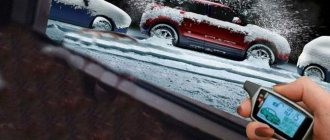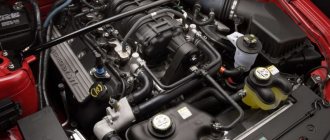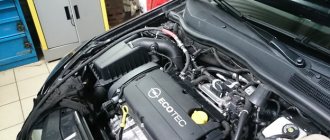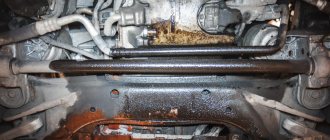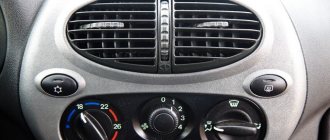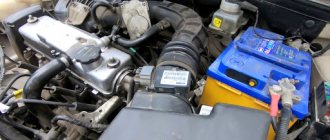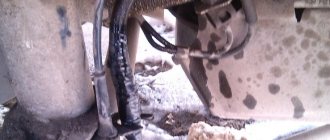A common problem during the operation of any internal combustion engine is that at a certain point, a gasoline or diesel engine begins to experience difficulties at the time of start-up. A diesel engine can run hot or cold for many reasons.
Such symptoms can appear regardless of the time of year and taking into account high-quality “winter” or “summer” diesel fuel according to the season, as well as the presence of the necessary antigel additives or dehydrators in the fuel tank. It happens that a diesel engine does not start well in the morning and you have to turn the starter for a very long time, and sometimes a heated engine cannot be started even “hot” after several minutes of parking. The first on the list of faults is loss of compression of the diesel engine.
We also recommend reading the article about fuel injection pump. From this article you will learn about the design, principles of operation and operating features of the high-pressure fuel pump of a diesel engine.
Low diesel engine compression
If a cold diesel engine does not start, and it is also difficult to start a diesel engine when it is hot, then the issue of measuring compression should be given increased attention, especially in winter.
Difficulty starting a cold diesel engine often occurs after a long period of inactivity, although restarting an already warmed-up diesel engine can also be difficult. After starting, the diesel engine does not hold idle speed, it “troits”, the diesel engine speed fluctuates while driving, and at idle the diesel engine vibrates strongly or stalls.
With low diesel compression, the engine does not immediately start (pick up) at the moment of starting, and starts with a clear delay. Low diesel compression also affects the operation of the engine after starting, the diesel engine oscillates and vibrates strongly, there is unstable operation, etc. It turns out that the fuel-air mixture is not sufficiently compressed and heated, as a result of which ignition does not occur.
A common reason for the lack of necessary compression in a diesel engine is cylinder wear, which leads to loss of tightness. Destruction of the sealing (compression) piston rings and problems with the timing belt also lead to loss of compression. These faults require serious repairs of the diesel engine.
It is not uncommon for compression to be lost in only one of the cylinders. The diesel engine can start, but after starting the engine is very unstable, the diesel shakes violently. It also happens that combustion of the working mixture in a cylinder with low compression occurs, but extremely irregularly.
DPF
It is a mandatory element in all diesel engines that comply with the Euro-5 standard. The particulate filter is responsible for removing soot particles, which are carcinogens, from gases. The device collects and burns soot. To ignite soot, a large load on the engine is required (driving speed on highways). Unfortunately, during city driving, conditions for soot burnout do not arise in the engine and, therefore, many filters become clogged, which causes the engine to go into emergency mode.
Symptoms, malfunctions:
- transition to emergency mode
- high fuel consumption
- problems with operation, hard to start
Replacing the DPF/FAP filter: a damaged filter can be replaced with a new one. Replacements are available for most models. Sometimes you can use filters after factory restoration.
Diesel models:
- MAZDA 6 2.0 MZR-CD - has notorious problems with the soot burning procedure.
- OPEL INSIGNIA 2.0 CDTI - has a very sensitive filter to frequent city driving.
Diesel fuel froze in diesel engine
If it's cold outside and your diesel engine won't start or dies immediately after starting, then there may be a fuel problem. Diesel fuel requires a seasonal transition to “summer”, “winter” and even “arctic” diesel fuel for particularly cold regions. Diesel does not start in winter because unprepared summer diesel fuel thickens in the cold and turns into a waxed gel in the fuel tank and fuel lines.
Naturally, the fuel system of a diesel engine is not capable of pumping such frozen diesel fuel. The diesel fuel filter is the first to suffer from the formed paraffin crystals, as it becomes clogged. In this case, starting a diesel engine in winter is helped by heating the diesel fuel system, replacing the diesel engine fuel filter, as well as adding a special antigel additive to diesel fuel. Less frequently, it may be necessary to flush the diesel fuel system. In extreme cases, frozen diesel fuel leads to the need for expensive repairs of diesel fuel equipment.
The causes of problems are improper care and improper operation of the diesel engine.
The most common reason why a diesel engine stalls is the car owner’s violation of basic operating rules. In addition, this may be influenced by failure to comply with the deadlines for carrying out preventive work. For example, due to the fact that diesel fuel contains a large amount of sulfur, the oil must be changed every 7.5 thousand kilometers. Oil can quickly oxidize and lose its performance characteristics, which negatively affects the condition of the pistons.
It is necessary to constantly and constantly pay attention to the cleanliness of fuel parts and promptly drain waste from the tank and filter. They should be cleaned at least twice a year to prevent filter clogging.
We recommend: Motor oils and everything you need to know about motor oils
Water in the fuel system of a diesel engine
Water entering the fuel system of a diesel engine can occur for various reasons. Often, water in the tank appears as a result of condensation, and condensation itself forms most actively in cold weather. Water is often present in low-quality diesel fuel, settling at the bottom of the fuel tank.
Diesel fuel and water do not mix, and water entering a diesel engine can lead to failure of the high-pressure fuel pump (HPF) or water hammer. Manufacturers install a coarse fuel filter, which retains water and other impurities.
If the diesel engine does not start when cold, then the cause may be freezing of the water in the filter. To prevent water accumulation in the fuel system, you can pour a little alcohol or a special diesel fuel additive into the tank, called a dehydrator.
Bacteriological factor
Unlike gasoline, diesel fuel is a fertile environment for the proliferation of microorganisms and bacteria. This is especially often observed when water gets into the tank - an ideal environment for reproduction. The rapid growth of bacteria causes the appearance of mucus, acids and other potentially dangerous substances that stick together the fuel pump, filters, and injectors. The process is accompanied by abundant formation and release of hydrogen sulfide, so the fuel in the tank has a persistent unpleasant smell of rotten eggs. As the temperature rises, the process of reproduction of microorganisms only intensifies, but the problem is sometimes typical in frosty weather.
To get rid of unwanted guests, it is recommended to completely drain and clean the fuel tank. For this purpose, special additives are used - biocides. A fresh and cleaned tank is treated with biocides for preventive purposes, after which fuel can be poured into it. Fuel wires and the pump are also cleaned if they are dirty.
Quality of diesel engine oil
Lower outside temperatures often cause diesel engines to have difficulty starting in winter. The reason may be that the oil in the diesel crankcase is thick. Diesel engines are often operated on 15W-40 motor oil. At low temperatures, this viscosity indicator can make it difficult to start a diesel engine.
To check, just pull out the oil dipstick and assess the condition of the engine oil after the diesel car has been parked in the cold. The oil on the dipstick should show signs of fluidity. Otherwise, and there is obvious solidification of the oil, it is advisable to switch to a synthetic motor oil with a lower viscosity recommended for a particular engine.
Why doesn't a diesel engine start when cold? - reasons for this phenomenon
There may be a problem with the glow plugs, which perform an important function - heating the working chamber of the cylinder, which contributes to the rapid self-ignition of diesel fuel. But, if the starter clicks but does not turn, then there may be a problem with the electrical or mechanical part of the starter, or the contacts on the battery.
In this case, if you need to charge the battery, you need to know how to properly charge a car battery. The fact is that if the density is greater than 1.27, then the acid separates from the water, and the heating water leads to an explosion of the battery.
Starter and battery
Most problems with these elements appear more often during the cold season. With an undercharged battery and/or a faulty starter, a diesel engine always starts poorly, but starting a diesel engine in cold weather involves a whole host of difficulties. If there is a minus overboard, the battery noticeably loses its charge.
A weak battery means:
- the inability to rotate the crankshaft of a diesel internal combustion engine at the required frequency to create pressure;
- insufficient glow of spark plugs to heat the fuel-air mixture in the cylinders;
Any oil in the cold becomes more viscous in the engine crankcase. It becomes more difficult for the starter to crank the crankshaft of a diesel engine in conditions of low temperatures and thickened engine oil. If the starter is worn out, the starter is jammed, or there are extraneous sounds from the starter when starting the diesel engine, then this may be the reason for the poor start.
Tips for beginners
The design features of the diesel engine provide for high compression and timely supply of fuel. To make it easier to start a diesel engine when cold, several rules should be followed:
- Monitor the condition of the filter element. Drain the water from the sump regularly.
- Use lubricant with low viscosity. The specification is selected separately for each case.
- Monitor the condition of the graphite brushes of the electric starter and the guide bushings of the armature axis.
- Use fuel that meets operating conditions.
- Check the performance of the glow plugs.
Diesel engines have difficulty starting in cold weather for several reasons. To identify a breakdown, it is necessary to carry out a number of diagnostic measures. In some cases, the use of specialized equipment is required. Taking into account several rules, you can avoid difficulties with poor starting of a diesel engine in cold weather.
How does your car's diesel start at low temperatures? Have you ever had difficulty starting your power unit in cold weather? How did you solve the problem? Share useful information with friends on social networks and save the article to bookmarks.
The topic of the article is explained more clearly in the video:
Glow plugs, relays and control unit
It happens that the battery is charged, the starter confidently turns the crankshaft, but the diesel engine still does not start. The problem may be a faulty glow plug. The fuel that enters the diesel cylinders is additionally heated. The diesel fuel in the cylinders is heated by the glow plugs of a diesel engine.
These spark plugs make starting a cold engine easier. The glow plugs are powered through a relay and have a control unit (timer) that controls the heating of the plugs taking into account a given amount of time. After a certain operating time, the relay stops supplying voltage to the glow plugs. In some engines, glow plugs heat diesel fuel until the diesel engine reaches operating temperature completely.
Malfunction of glow plugs does not always occur. A cold diesel engine can start normally in warm weather, as well as “hot” if one or even two spark plugs fail.
With the onset of cold weather, starting a diesel engine with one non-working glow plug is very difficult, but possible. After starting, such a motor will work unstably until it warms up. To check the glow plugs, they are first unscrewed. Next you need to measure their resistance.
Problems can be associated not only with the spark plugs, but also with the glow plug relay. During normal operation, the relay makes quiet clicks when the key is turned in the ignition before starting. The electronic unit that controls the spark plugs may also be faulty. If the characteristic clicks of the relay are not noticed when you try to start the diesel engine, then a malfunction of the relay or unit is likely.
Fuel filter clogged
You can find out in advance that the fuel does not completely enter the combustion chambers. There are many signs that indicate that the fuel filter needs cleaning or replacement:
- increased fuel consumption;
- unstable operation (up to stopping) at idle;
- when the engine speed increases, “failures” occur in its operation;
- difficult starting;
- reduction in engine power and torque;
- spontaneous inhibition;
- jerking when going uphill.
All these signs indicate that a clogged filter is creating additional resistance to air flow, which leads to excessive load on the power unit. It remains to be found out why the fuel filter becomes dirty. There are not many reasons:
- refueling with fuel of questionable quality;
- pouring fuel from contaminated containers;
- high level of air dust.
It's time to change this filter
Air has entered the fuel system of the diesel engine.
A feature of the diesel engine is that air and fuel are supplied to the cylinders separately. Air entering the fuel system can cause the diesel engine to have difficulty starting. An air lock in the fuel system of a diesel engine or air in the fuel injection pump means that the diesel engine will stall.
Air often does not enter the fuel line through the high pressure fuel pump. The cause of air entering the diesel engine power system may be damage to the fuel line. Cracks, lack of tightness of connections and other malfunctions mean that air is “leaked” in the diesel engine. Air is removed by bleeding the injection pump and fuel line.
Ice jams in fuel
A rather trivial problem, but one that precludes further operation, is water accumulated, for example, in a fuel filter. The process of water formation is affected by the quality of fuel, ambient temperature, number of engine starting cycles, etc.
Many diesel engines have a special drain plug at the bottom of the fuel filter housing, from which accumulated water must be drained from time to time. If this is not done, the water may freeze and the ice plug will block the fuel supply to the engine.
Faulty injection pump or diesel injectors
Diesel engine injectors may become dirty during operation. Diesel injectors are polluted by deposits of varnish, sulfur and other impurities that are present in diesel fuel. An equally important aspect is the natural wear and tear of the injectors.
A special feature of diesel injectors is that fuel is pumped through them under high pressure, which significantly exceeds the pressure in gasoline counterparts. Wear and contamination of diesel injectors leads to a decrease in fuel supply pressure. An acceptable threshold is up to 300psi. If the pressure is lower, then repair or replacement of diesel injectors is necessary.
Faulty diesel engine injectors are not able to spray diesel fuel evenly, and the shape of the spray pattern changes. This manifests itself in a loss of diesel power; the diesel engine stalls at idle and under load.
If the diesel engine fails after warming up, then there are likely problems with the injection pump plunger pair. Wear of fuel injection pump elements requires immediate repair.
The fuel is not quite winter friendly
Diesel fuel that does not meet official winter standards will not allow you to start the engine in the morning after overnight frosts. If paraffin precipitates, the fuel filter or line will clog and the fuel supply will stop.
To avoid troubles, you need to refuel with high-quality winter fuel at proven gas stations. If doubts remain, then it is better to use a special fuel additive and preferably before the onset of frost.
Diesel exhaust color
Analyzing the color of diesel exhaust may indicate part of the problem. If a diesel engine produces bluish smoke, this indicates that the fuel does not burn quickly. Blue diesel exhaust is caused by fuel evaporating in the exhaust system from contact with heated parts. In the cylinders themselves, it is not possible to completely and evenly burn the mixture of diesel fuel and air.
It is worth noting that during the warm-up process of a diesel engine, white or bluish exhaust is allowed. After the diesel engine reaches operating temperature, this exhaust color indirectly indicates:
- low diesel compression;
- problems with fuel injection pump or injectors;
- late injection advance angle;
- possible malfunction of glow plugs;
- failure of the relay or glow plug control unit;
Black diesel exhaust indicates that the injectors are overfilling with fuel. The second reason why a diesel engine smokes black smoke is insufficient air supply to the cylinders. This indicates problems in the air supply system, and the cause is severe contamination of the diesel engine air filter.
Why is diesel difficult to start?
The system includes:
- glow plugs;
- heating relay;
- a bus that connects all spark plugs into a single circuit.
The check should begin with the glow plugs. I can assure you that the popular test method of measuring resistance with a multimeter is a largely ineffective test.
It is designed to detect a rupture of the heating element (in this case there will be no resistance). All spark plugs may have resistance, but they will be the reason for poor starting in cold winter.


